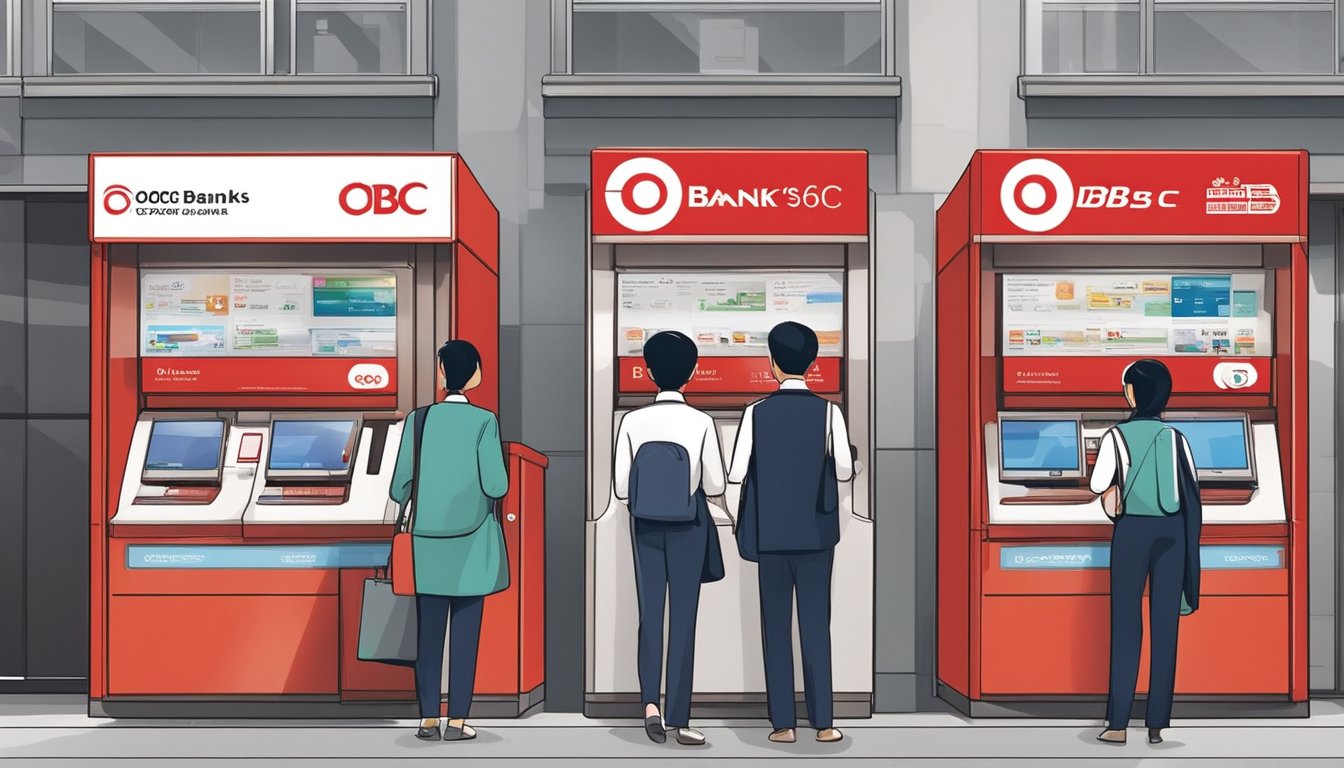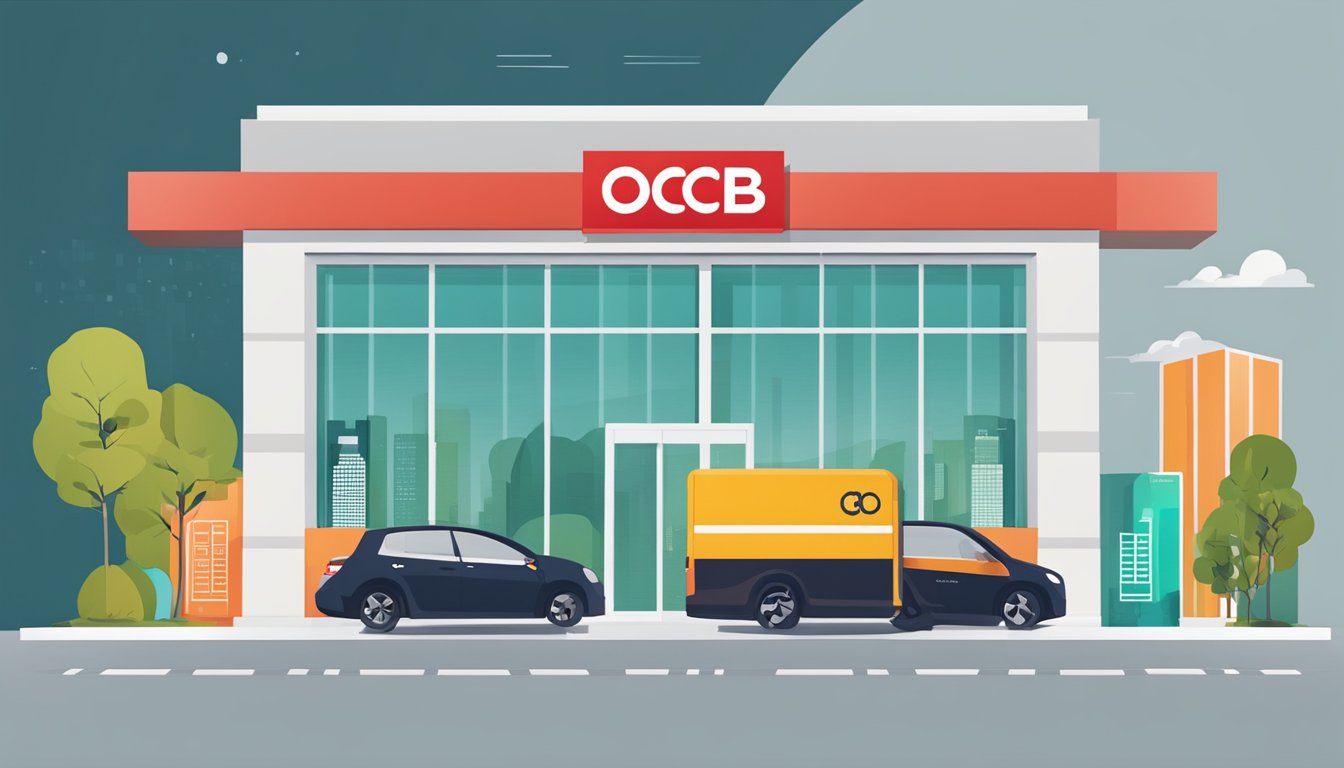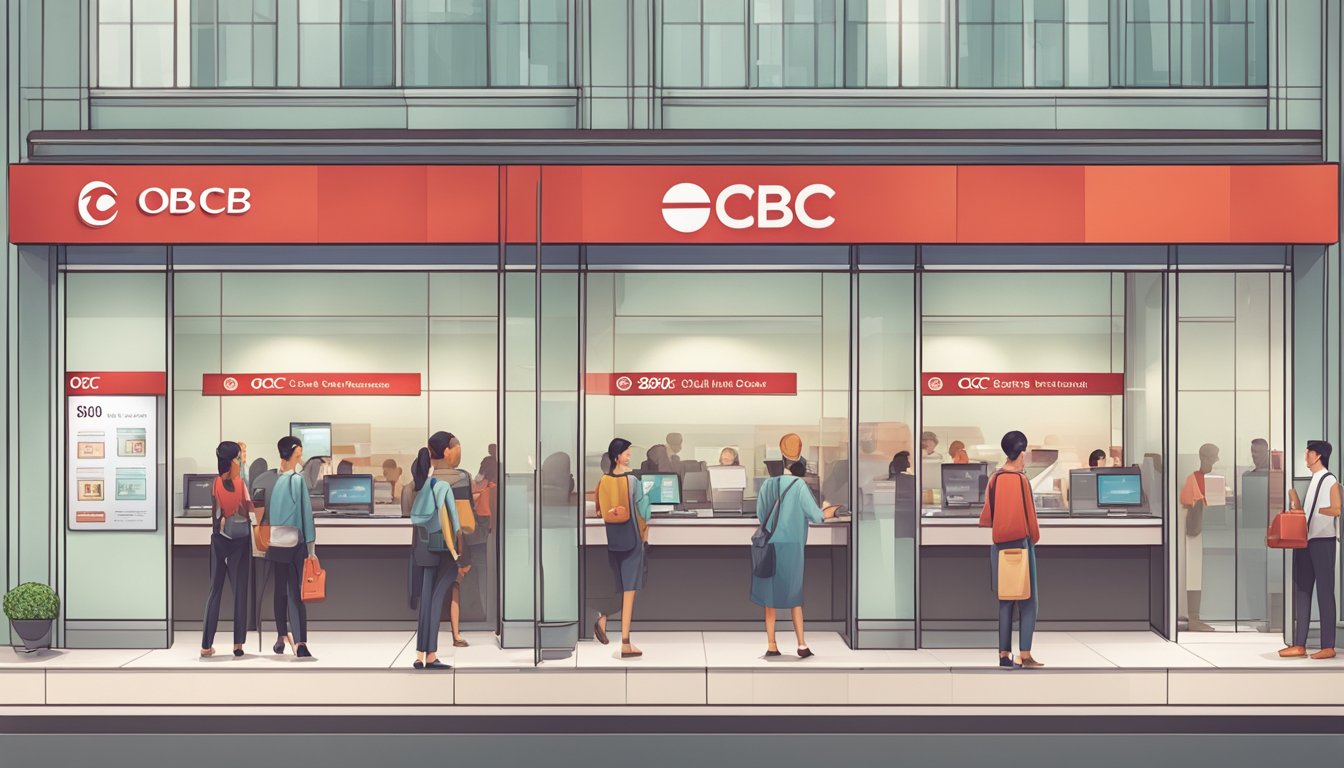If you’re looking for a high-interest savings account in Singapore, you’ve probably heard of the OCBC 360 and DBS Multiplier accounts. Both of these accounts offer attractive interest rates, but which one is better for you? In this article, we’ll compare these two accounts to help you make an informed decision.

First, let’s take a look at the basic features of each account. The OCBC 360 account offers interest rates of up to 3.45% p.a., while the DBS Multiplier account offers interest rates of up to 3.8% p.a. To earn the highest interest rates, both accounts require you to fulfil certain criteria, such as salary crediting, credit card spending, and more. However, the specific requirements differ between the two accounts.
So, how do you decide which account is right for you? In the next section, we’ll compare the OCBC 360 and DBS Multiplier accounts in more detail, so you can maximise your savings and make the most of your money.
Key Takeaways
- Comparing OCBC 360 and DBS Multiplier Accounts can help you choose the best high-interest savings account in Singapore
- Maximising Your Savings requires understanding the different Bonus Interest Categories of each account
- Evaluating Fees and Additional Benefits can also help you make an informed decision
Comparing OCBC 360 and DBS Multiplier Accounts

When it comes to high-interest savings accounts, two of the most popular options in Singapore are the OCBC 360 and the DBS Multiplier. Both accounts offer attractive interest rates and a range of benefits, but which one is right for you? In this section, we’ll take a closer look at the key features and benefits, interest rate structures, and eligibility criteria for both accounts to help you make an informed decision.
Key Features and Benefits
The OCBC 360 account offers a range of benefits, including a high base interest rate of up to 0.5% p.a. and bonus interest rates of up to 7.65% p.a. when you fulfil certain criteria. These criteria include crediting your salary, increasing your average daily balance, and spending on an OCBC credit card.
On the other hand, the DBS Multiplier account offers a base interest rate of 0.05% p.a. and bonus interest rates of up to 3.8% p.a. when you fulfil certain criteria. These criteria include crediting your salary and transacting in other DBS products such as home loans, investments, and insurance.
Interest Rate Structures
The interest rate structure for both accounts is quite different. The OCBC 360 account offers a tiered interest rate structure, with different interest rates for different tiers of account balances. For example, you can earn 0.05% p.a. on the first $35,000 of your account balance, 0.25% p.a. on the next $35,000, and 0.35% p.a. on the remaining balance.
The DBS Multiplier account, on the other hand, offers a flat interest rate of 0.05% p.a. on the first $50,000 of your account balance, and a higher interest rate of up to 3.8% p.a. on the remaining balance when you fulfil certain criteria.
Eligibility Criteria
To be eligible for the OCBC 360 account, you must be a Singapore citizen or permanent resident, at least 18 years old, and have a minimum initial deposit of $1,000. You must also fulfil certain criteria to earn bonus interest rates, such as crediting your salary, increasing your average daily balance, and spending on an OCBC credit card.
To be eligible for the DBS Multiplier account, you must be a Singapore citizen or permanent resident, at least 18 years old, and have a minimum initial deposit of $3,000. You must also fulfil certain criteria to earn bonus interest rates, such as crediting your salary and transacting in other DBS products.
In conclusion, both the OCBC 360 and DBS Multiplier accounts offer attractive interest rates and a range of benefits. Your choice will depend on your individual needs and preferences, as well as your ability to fulfil the eligibility criteria.
Maximising Your Savings

If you are looking to maximise your savings with a high-interest savings account, both OCBC 360 and DBS Multiplier accounts are great options. However, you need to be aware of the strategies that can help you earn higher interest rates and maintain your account balance.
Strategies for Higher Interest
To earn higher interest rates, you need to fulfil specific criteria related to account activity and balance. For OCBC 360, you can earn bonus interest rates by doing the following:
- Credit card spending: You can earn up to 3% p.a. bonus interest rate by spending at least $500 on your OCBC credit cards.
- Salary crediting: You can earn up to 1.2% p.a. bonus interest rate by crediting your salary of at least $2,000 into your OCBC 360 account.
- Bill payments: You can earn up to 1% p.a. bonus interest rate by paying at least three bills online or through GIRO.
For DBS Multiplier, you can earn bonus interest rates by doing the following:
- Salary crediting: You can earn up to 1.8% p.a. bonus interest rate by crediting your salary of at least $2,000 into your DBS Multiplier account.
- Investments: You can earn up to 1.8% p.a. bonus interest rate by investing in unit trusts or insurance products.
- Home loan: You can earn up to 1.5% p.a. bonus interest rate by taking a home loan with DBS.
Maintaining Account Balance
To maintain your account balance, you need to ensure that you have sufficient funds in your account. For OCBC 360, you need to maintain a minimum balance of $3,000 to earn bonus interest rates. For DBS Multiplier, you need to maintain a minimum balance of $3,000 to earn bonus interest rates.
By following these strategies, you can maximise your savings and earn higher interest rates. Remember to keep track of your account balance and fulfil the criteria to earn bonus interest rates.
Understanding Bonus Interest Categories

When it comes to choosing between the OCBC 360 and DBS Multiplier accounts, understanding the bonus interest categories is important. Both accounts offer bonus interest features, but the DBS Multiplier account offers a more flexible way to earn bonus interest.
Salary Crediting and Bill Payments
With the DBS Multiplier account, you can earn bonus interest by fulfilling any of five categories. One of these categories is salary credit. You can earn up to 1.8% p.a. bonus interest on your DBS Multiplier account balance when you credit your salary to your DBS account.
Another category is GIRO bill payments. You can earn up to 0.3% p.a. bonus interest on your DBS Multiplier account balance when you pay three unique bills via GIRO.
Credit Card Spending and Investments
Credit card spending is another category that can earn you bonus interest on your DBS Multiplier account. You can earn up to 0.5% p.a. bonus interest on your DBS Multiplier account balance when you spend on your DBS/POSB credit cards.
Investments are also a category that can earn you bonus interest on your DBS Multiplier account. You can earn up to 2.8% p.a. bonus interest on your DBS Multiplier account balance when you invest in eligible investment products.
Insurance and Loan Commitments
Insurance and loan commitments are the final two categories that can earn you bonus interest on your DBS Multiplier account. You can earn up to 1.2% p.a. bonus interest on your DBS Multiplier account balance when you purchase an eligible insurance product with DBS/POSB.
You can also earn up to 1.2% p.a. bonus interest on your DBS Multiplier account balance when you have a home loan or eligible loan commitment with DBS/POSB.
Overall, the DBS Multiplier account offers a more flexible way to earn bonus interest than the OCBC 360 account. By fulfilling any of the five categories, you can earn bonus interest on your account balance.
Financial Tools for Different Lifestyles

When it comes to choosing between the OCBC 360 and DBS Multiplier accounts, it’s important to consider your lifestyle and financial needs. Here are some factors to consider:
Salaried Workers and Freelancers
If you’re a salaried worker or freelancer, both the OCBC 360 and DBS Multiplier accounts offer attractive interest rates. However, the DBS Multiplier account may be a better option if you have a more irregular income or if you’re self-employed. This is because the DBS Multiplier account allows you to earn bonus interest by fulfilling any of five categories: salary credit, credit card spend, home loan instalment, insurance, and investments.
On the other hand, if you have a more stable income and prefer to keep your finances simple, the OCBC 360 account may be a better option. The account offers bonus interest for meeting certain transaction requirements, such as credit card spend, GIRO transactions, and investments.
Families and Retirees
If you have a family or are retired, you may have different financial needs than a salaried worker or freelancer. For example, you may need to save for your children’s education or plan for your retirement.
Both the OCBC 360 and DBS Multiplier accounts offer features that can help you meet these goals. For example, the OCBC 360 account offers bonus interest for increasing your monthly balance, while the DBS Multiplier account offers bonus interest for home loan instalments and insurance.
In addition, both accounts offer a range of financial tools that can help you manage your money. For example, the OCBC 360 account offers a budgeting tool that can help you track your expenses and savings, while the DBS Multiplier account offers a retirement planning tool that can help you plan for your future.
Overall, the OCBC 360 and DBS Multiplier accounts are both great options for savers in Singapore. By considering your lifestyle and financial needs, you can choose the account that’s right for you.
Evaluating Fees and Additional Benefits

Fee Structures and Waivers
When choosing between the OCBC 360 and DBS Multiplier accounts, it is important to consider the fees associated with each account. Both accounts have a minimum average daily balance requirement of $3,000 to avoid fall-below fees. The fall-below fee for the OCBC 360 account is $2, while the DBS Multiplier account has a fall-below fee of $5. However, both banks waive the fall-below fee if you have a minimum deposit in your account.
In terms of other fees, both accounts do not charge any fees for account opening or closure, cash withdrawals, or online transactions. However, there may be fees for certain services such as cheque book requests, stop payment requests, and account statements.
Promotions and Extras
Both the OCBC 360 and DBS Multiplier accounts offer promotions and extras to entice customers. For example, the OCBC 360 account offers bonus interest rates of up to 1.2% p.a. for meeting certain requirements such as salary crediting, bill payments, and credit card spending. On the other hand, the DBS Multiplier account offers bonus interest rates of up to 1.8% p.a. for meeting similar requirements.
In addition, both banks offer promotions such as cashback and rewards points for new account sign-ups and fulfilling certain criteria. For example, OCBC currently offers a promotion for new customers who deposit at least $50,000 in fresh funds into their OCBC 360 account, while DBS offers cashback for new customers who open a DBS Multiplier account and credit their salary into the account.
When evaluating promotions and extras, it is important to consider the terms and conditions, such as the bonus interest cap and the validity period of the promotion. It is also important to ensure that you can meet the requirements to qualify for the promotion.
Overall, when comparing the OCBC 360 and DBS Multiplier accounts, it is important to consider the fees and additional benefits to determine which account is the best fit for your financial needs.
Frequently Asked Questions

What benefits does the OCBC 360 account offer compared to the DBS Multiplier?
The OCBC 360 account offers a range of benefits compared to the DBS Multiplier. Firstly, the OCBC 360 account offers a higher interest rate of up to 1.8% p.a. compared to the DBS Multiplier’s maximum interest rate of up to 3.8% p.a. Additionally, the OCBC 360 account offers a wider range of bonus interest categories, including insurance, investments, and home loans, which can help you earn more interest on your savings.
How do salary crediting requirements differ between the OCBC 360 and DBS Multiplier accounts?
Both the OCBC 360 and DBS Multiplier accounts require salary crediting to earn bonus interest rates. However, the DBS Multiplier account requires a higher minimum salary credit of $2,000 compared to the OCBC 360 account’s minimum salary credit of $1,800. Additionally, the DBS Multiplier account requires you to have at least one other transaction category, such as credit card spending or investments, to earn bonus interest.
Can you share experiences or reviews of using the OCBC 360 versus the DBS Multiplier account?
Many users have reported positive experiences using both the OCBC 360 and DBS Multiplier accounts. Some have found the OCBC 360 account to be more flexible and easier to use due to its wider range of bonus interest categories. Others have preferred the DBS Multiplier account for its higher interest rates and more straightforward bonus interest requirements.
What are the key differences in interest rates between the OCBC 360 and the DBS Multiplier?
The key difference in interest rates between the OCBC 360 and DBS Multiplier accounts is that the DBS Multiplier account offers a higher maximum interest rate of up to 3.8% p.a. compared to the OCBC 360 account’s maximum interest rate of up to 1.8% p.a. However, the OCBC 360 account offers a wider range of bonus interest categories, which can help you earn more interest on your savings.
How does the OCBC 360 account stack up against the UOB One for savings?
The OCBC 360 account and UOB One account are both popular savings accounts in Singapore. While the UOB One account offers a higher maximum interest rate of up to 2.5% p.a., the OCBC 360 account offers a wider range of bonus interest categories, which can help you earn more interest on your savings. Additionally, the OCBC 360 account has a lower minimum salary credit requirement of $1,800 compared to the UOB One account’s minimum salary credit requirement of $2,000.
What drawbacks should one be aware of when using the DBS Multiplier account?
One drawback of using the DBS Multiplier account is that it requires a higher minimum salary credit of $2,000 compared to other savings accounts. Additionally, the DBS Multiplier account requires you to have at least one other transaction category, such as credit card spending or investments, to earn bonus interest. Finally, some users have reported that the DBS Multiplier account can be more complicated to use compared to other savings accounts.




